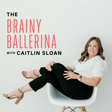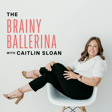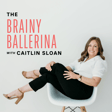
52. Say Yes to Yourself: Michelle Thompson on Creating Your Own Opportunities in a Dance Career
In this inspiring episode, I sit down with Michelle Thompson - former dancer with Ballet Austin, seasoned educator, and freelance choreographer based in New York City.
Michelle shares her remarkable journey from a spontaneous childhood dance debut at a neighborhood party to training at San Francisco Ballet School, a fulfilling 14-year career at Ballet Austin, and her transition into teaching and choreography.
Michelle offers candid insight into the realities of a professional dance career - from balancing motherhood while performing, to navigating rejection, and the often unseen work of carving out a path as a freelance choreographer.
This conversation is full of wisdom about longevity, resilience, community, and the importance of saying “yes” to yourself.
Key Topics:
✨ The lessons performing in company productions as a student taught her about professionalism
✨ How hard work, consistency, and openness shaped her long career at Ballet Austin
✨ What it’s really like being a dancing mom and how community made it possible
✨ The importance of persistence through rejection and why “no” isn’t the end of the story
✨ Michelle’s teaching philosophy beyond technique: consistency, communication, and a positive attitude
If you're a dancer navigating the unpredictable world of auditions, contracts, or freelance creative work, this conversation will give you both practical guidance and soulful encouragement.
Connect with Michelle:
INSTAGRAM: instagram.com/michelle_thompson_ulerich
DINNER PARTY PROJECT: https://www.instagram.com/dinner_party_project_nyc/
EMAIL: michelle.ulerich@gmail.com
Links and Resources:
Get your copy of The Intentional Career Handbook
Set up ticketing for your next event with DRT (Make sure to mention that The Brainy Ballerina sent you!)
1-1 Career Mentoring: book your complimentary career call
Let’s connect!
My WEBSITE: thebrainyballerina.com
INSTAGRAM: instagram.com/thebrainyballerina
Questions/comments? Email me at caitlin@thebrainyballerina.com


